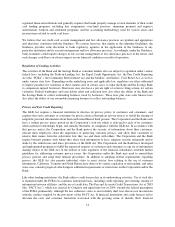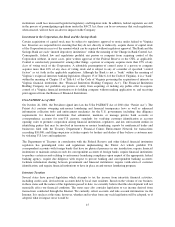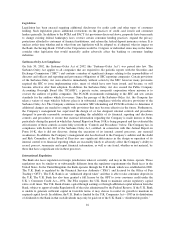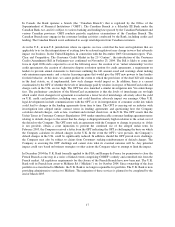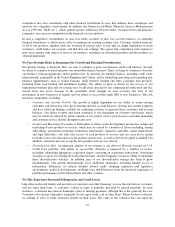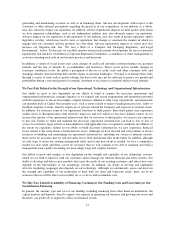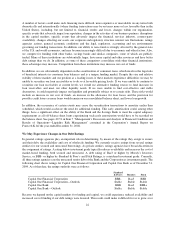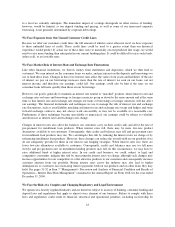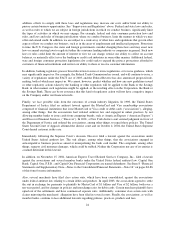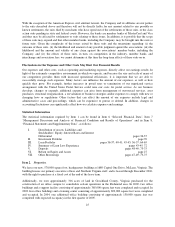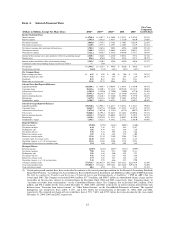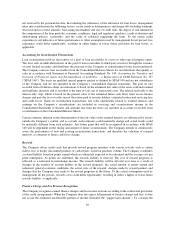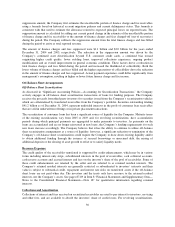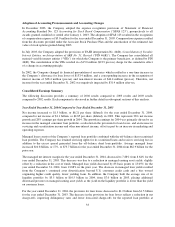Capital One 2004 Annual Report Download - page 47
Download and view the complete annual report
Please find page 47 of the 2004 Capital One annual report below. You can navigate through the pages in the report by either clicking on the pages listed below, or by using the keyword search tool below to find specific information within the annual report.addition, efforts to comply with these laws and regulations may increase our costs and/or limit our ability to
pursue certain business opportunities. See “Supervision and Regulation” above. Federal and state laws and rules,
as well as rules to which we are subject in foreign jurisdictions in which we conduct business, significantly limit
the types of activities in which we may engage. For example, federal and state consumer protection laws and
rules, and laws and rules of foreign jurisdictions where we conduct business, limit the manner in which we may
offer and extend credit. In addition, we are subject to a wide array of other laws and regulations that govern other
aspects of how we conduct our business, such as in the areas of employment and intellectual property. From time
to time, the U.S. Congress, the states and foreign governments consider changing these laws and may enact new
laws or amend existing laws to regulate further the consumer lending industry or companies in general. Such new
laws or rules could limit the amount of interest or fees we can charge, restrict our ability to collect on account
balances, or materially affect us or the banking or credit card industries in some other manner. Additional federal,
state and foreign consumer protection legislation also could seek to expand the privacy protections afforded to
customers of financial institutions and restrict our ability to share or receive customer information.
In addition, banking regulators possess broad discretion to issue or revise regulations, or to issue guidance, which
may significantly impact us. For example, the Federal Trade Commission has issued, and will continue to issue, a
variety of regulations under the FACT Act of 2003, and the Federal Reserve has also announced proposed rule-
making, both of which may impact us. We cannot, however, predict whether and how any new guidelines issued
or other regulatory actions taken by the banking or other regulators will be applied to the Bank or the Savings
Bank, in what manner such regulations might be applied, or the resulting effect on the Corporation, the Bank or
the Savings Bank. There can be no assurance that this kind of regulatory action will not have a negative impact
on the Company and/or our financial results.
Finally, we face possible risks from the outcomes of certain industry litigation. In 1998, the United States
Department of Justice filed an antitrust lawsuit against the MasterCard and Visa membership associations
composed of financial institutions that issue MasterCard or Visa credit or debit cards (“associations”), alleging,
among other things, that the associations had violated antitrust law and engaged in unfair practices by not
allowing member banks to issue cards from competing brands, such as American Express (“American Express”)
and Discover Financial Services, (“Discover”). In 2001, a New York district court entered judgment in favor of
the Department of Justice and ordered the associations, among other things, to repeal these policies. The United
States Second Court of Appeals affirmed the district court and on October 4, 2004, the United States Supreme
Court denied certiorari in the case.
Immediately following the Supreme Court’s decision, Discover filed a lawsuit against the associations under
United States federal antitrust law. The suit alleges, among other things, that the associations engaged in
anticompetitive business practices aimed at monopolizing the bank card market. The complaint, among other
things, requests civil monetary damages, which could be trebled. Neither the Corporation nor any of its entities is
a named defendant in this lawsuit.
In addition, on November 15, 2004, American Express Travel Related Services Company, Inc., filed a lawsuit
against the associations and several member banks under the United States federal antitrust law. Capital One
Bank; Capital One, F.S.B.; and Capital One Financial Corporation are named defendants. See Item 8 “Financial
Statements and Supplementary Data—Notes to the Consolidated Financial Statements—Note 16” on pages 84-86
of this form for more information.
Also, several merchants have filed class action suits, which have been consolidated, against the associations
under federal antitrust law relating to certain debit card products. In April 2003, the associations agreed to settle
the suit in exchange for payments to plaintiffs by MasterCard of $1 billion and Visa of $2 billion, both over a
ten-year period, and for changes in policies and interchange rates for debit cards. Certain merchant plaintiffs have
opted out of the settlements and have commenced separate suits. Additionally, consumer class action suits with
claims mirroring the merchants’ allegation have been filed in several courts. Finally, the associations, as well as
member banks, continue to face additional lawsuits regarding policies, practices, products and fees.
24


